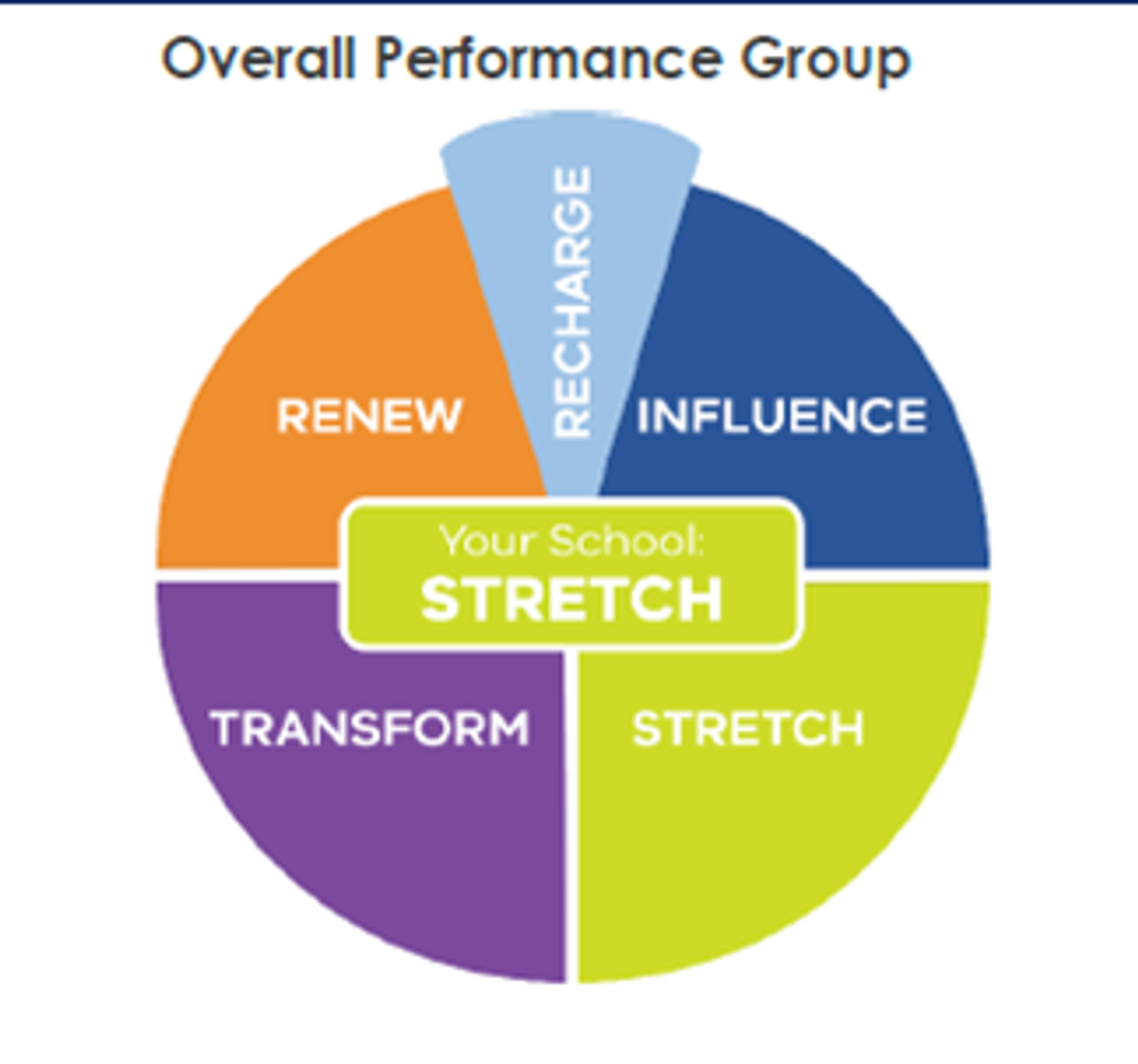College News

Reason to Celebrate
Each year schools receive their annual performance report to inform ongoing school improvement and planning. For example, right now we are coming to the end of the 2023 annual implementation plan and using this years data and performance report to target key areas in 2024.
The Department uses Differentiated School Performance Groups (performance group) to inform how it undertakes school reviews; which Edenhope College will be undertaking in 2024; and supports schools’ improvement processes. The 5 performance groups are: transform, stretch, influence, renew, and recharge. As you can see in the image below, we are sitting as a ‘stretch’ school. Meaning performance is improving from a moderate or low base. These schools could be high performing if they stretch and continued to improve. As an overall performance group, this indicates that the majority of domains and measures have been improving.
Within the performance report, we have also become an influence school in three areas. This means performance is high or very high. This level of performance is maintained consistently over 3 years or is on a positive improvement trajectory with the school acting as an influencer and system leader.
Our areas of influence:
Reading
% of students with Medium or High Relative Growth (Years 3 to 5)
% of students with Medium or High Relative Growth (Years 7 to 9)
Numeracy
% of students with Medium or High Relative Growth (Years 3 – 5)
% of students in Strong or Exceeding (Year 9)
Student Engagement
% of positive endorsement in Sense of Confidence (Years 7-12)
% of positive endorsement in Sense of Confidence (Years 4-6)
Edenhope College’s 2020 – 2024 Strategic Plan set some lofty goals in regards to our students engagement in learning, which can be seen below.
- Student voice and agency from 38% (2019) to 60% or above
- Self–regulation and goal setting from 55% (2019) to 70% or above
- Stimulated learning from 47% (2019) to 65% or above
- Motivation and interest from 50% (2019) to 70% or above
Results from this year’s Attitudes to School Survey that we have reached, or nearly reached each of the four targets twelve months ahead of schedule.
Results from 2023
- Student voice and agency: 60%
- Self–regulation and goal setting: 64%
- Stimulated learning: 61%
- Motivation and interest: 62%
Although lofty goals had been set, it is fantastic that we have reached one a year ahead, with the remaining three being within striking distance. It is a testament to the work that has been put in by the whole school community.
Amongst the business of the day-to-day functioning of a school, it is important to stand back and look at the forest from the trees and celebrate our improvements and acknowledge areas of future growth.
Parents and Friends
A massive shout out to the Parents and Friends team of Sarah Joubert, Jen Altmann, Katelyn Kelly, Loren Linto, Jess Sambell, Toni Domaschenz, Kelly McLeay and led by Trilby Hartas. The group, who are all busy on other committees continue to find ways to support the school and our students to be able to participate in an array of extra-curricula activities, such as the Great Vic Bike Ride, Energy Breakthrough and their ongoing support of the Ag program. Most recently giving up time to cook the referendum BBQ, a BBQ at Junior Basketball and have planned a Christmas themed musical BINGO for December 16th. Our College appreciates all of the support. If anyone else can see themselves joining this extremely busy team, please contact the College.
Focus Groups
Later in the year the College will be looking for parent/carer volunteers to developing a focus groups specifically targeting and unpacking reporting at the College. We would like to know what it is parents actually want their child’s reports to look like, how current interim reports are viewed and how they could be improved and to look at College communication in relation to student learning. If this is something you would be interested to be a part of, please make contact.
Tik Tok
TikTok has been a popular social media platform among young people, but there are growing concerns about its impact on their mental health and wellbeing. We are seeing some trending behaviours creep into Edenhope College, and some distasteful commentary/dialogue that has come directly from TikTok. A number of students from Years 5 – 9 seem to be the most at risk and at times don’t have the contextual understanding of what they are viewing to totally understand the content.
Some of the issues with TikTok for young people:
- Harmful content: TikTok can recommend videos for kids that can be extreme, provocative, and even toxic, which can exacerbate mental health problems for children and teenagers. One study found that when researchers posed as 13-year-old users and searched and liked mental-health videos, they received potentially harmful content (including about eating disorders and self-harm) from TikTok every few minutes or more.
- Addictive: TikTok's algorithm is very sophisticated and sticky, which keeps teens engaged on the platform longer. This can lead to teens spending more time on the app than they should, which can negatively impact their mental health.
- Encourages comparison: TikTok can encourage young people to compare themselves to others, which can lead to feelings of inadequacy and low self-esteem. For example, there is a lot of body checking on TikTok, with people showing off things about themselves that are maybe unachievable.
- Lurking predators: There is a possibility of encountering an online predator when using the app. Parents must take responsibility for having conversations with their children about the possible dangers on TikTok, ranging from harmful content to bullying to dangerous “challenges” to lurking predators.
- Aggravates mental health conditions: Growing research has found that the more time a person spends on social media, the more likely they will experience mental health symptoms such as anxiety. TikTok can also aggravate mental health conditions such as depression and eating disorders.
To address these issues, TikTok has introduced tools to help users set limits for how long they spend on the app each day and ways to filter out mature or “potentially problematic” videos. However, it is important for parents to monitor their children's activities on TikTok and have honest and open conversations with them about the possible dangers of the app.
Here are some tips for parents on teenage use of TikTok:
1. Supervise your kids: Using any social
network can be risky, but it's possible for
kids to safely use the app with
adult supervision (and a private account).
Talk to your kids about the content they’re
consuming when on TikTok and encourage
them to come to you when/if they’re seeing
content that is harmful or inappropriate.
2. Set up privacy and security settings: Set
your child's TikTok account to private, so
only friends can comment on videos, and
other users can't duet with their videos.
Also, make sure to limit contact from
strangers by setting up privacy and
security settings.
3. Use safety settings: TikTok has different
rules for different ages. Users under age 13
can't post videos or comment, and content
is curated for a younger audience. For kids
age 13 to 15, accounts are private by
default. Make use of TikTok safety features
to improve your child's experience on the
app.
4. Be aware of inappropriate content: TikTok's
emphasis on popular music means many
videos include swearing and sexual lyrics,
so it may not be age-appropriate for kids to
use on their own. With a quick hashtag
search, your child will have access to
mature content, as well as suggestive
themes and challenges. Parents have
expressed concerns about the
inappropriate language of some of the
videos posted which may make this less
suitable for younger children.
5. Encourage creativity: TikTok can provide a
creative outlet for your child. Encourage
them to use the app to express themselves
in a positive way.
Remember, TikTok can be a friendly experience if you supervise your kids, use safety settings, and stick to appropriate content.
Chad Frost
Acting Principal

